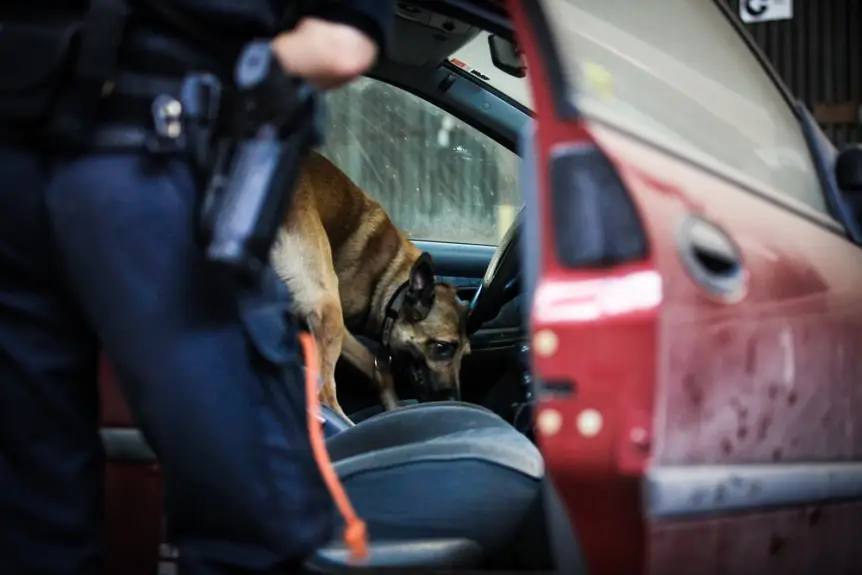Whether you’re in Los Angeles or traveling anywhere in the U.S., you are protected by the Fourth Amendment against unjustified searches. Despite this protection, there are several methods available to the police to be able to search your car without a warrant.
Still, an improper search of your car may be grounds to make evidence inadmissible in court. If evidence becomes suppressed by an illegal search or seizure, you may be eligible for a better plea agreement or even outright dismissal of your charges.

A police officer and a dog search a vehicle. The police can search your car without a warrant under specific circumstances.
How the Fourth Amendment Applies
The Fourth Amendment grants all Americans the freedom from unreasonable search and seizure. In essence, the police can only search your property if they have a warrant to do so. Unfortunately, despite this protection granted to you by the federal government, law enforcement still has ways and loopholes around it to search your car.
Method 1: As Part of an Arrest
An officer stops an individual because they have a reasonable suspicion that they may have committed a crime. After they have stopped the person and conducted an initial investigation, they may feel they have sufficient justification, known as probable cause, to arrest the individual for a crime.
Once the arrest has taken place, the officer has some right to conduct a search of the arrested individual. This means they may perform a more intrusive search of the person than would be completed during a Terry stop.
At this stage, the officer may also search the person’s vehicle. For example, the officer may do so if:
- The individual was recently in control of the vehicle.
- The officer has probable cause to believe there is evidence of the crime inside the vehicle.
Probable Cause
Probable cause is a recognized level of suspicion that requires more justification than reasonable suspicion. The officer must articulate specific facts about a situation that would make it seem appropriate to the average person that their search is justifiable.
An officer witnessing a driver tossing an open can of beer out of their window may not have enough information to have probable cause for a DUI arrest but has evidence of littering and reasonable suspicion of DUI.
However, suppose they pull the driver over and find other open containers of alcohol, and the individual smells strongly of alcohol. In that case, the officer may then have probable cause to initiate a DUI arrest.
Method 2: The Carroll Doctrine
Another method of warrantless vehicle searches comes under the Carroll doctrine. Named after a U.S. Supreme Court case, the Carroll doctrine states that an officer may search a car without a warrant if:
- The officer has probable cause that the car contains evidence relating to a crime or is otherwise carrying contraband.
- The officer has a reasonable belief that someone may move the vehicle and get rid of the evidence prior to obtaining a search warrant.
Under these circumstances, the officer may conduct a full search of the car. In addition, since the clarification of California v. Acevedo, police are also authorized to search locked containers within the vehicle.
Method 3: Inventory
When an individual gets arrested, their vehicle may get impounded. Once the vehicle gets impounded, officers are required to take an inventory of the car. This type of search does not require a warrant but does allow the officers to use anything found in the car as evidence in a criminal proceeding against the vehicle owner.
Method 4: Consent
Officers also may seek the driver’s consent to search a car without a warrant. If the driver gives consent, the officer can search the car as thoroughly as if they had received a warrant.
Police do not always ask for consent straightforwardly. They may ask in a way that isn’t clear. They may also try and pressure you, suggesting that a search would be okay if you didn’t have anything to hide.
Calmly asserting your right to refuse a search is not sufficient grounds to give the officer probable cause to search your vehicle.
Understanding Your Rights
One thing you should know is that even though the Fourth Amendment entitles you to privacy, many California courts still side with the police. Many judges tend to air on the belief that a car is a place where individuals expect to have a lower sense or expectation of privacy.
Thus, any evidence from an unwarranted search can still get admitted into court. When this happens, you aren’t completely powerless. You have options available under the law to fight back against improper searches.
Getting Assistance With Improper Searches
If there is a reason to suspect that evidence was obtained improperly, you can file to have the evidence suppressed. Suppressing evidence may:
- Weaken the prosecution’s case
- Result in a better plea bargain
- Result in the dismissal of charges
If an officer searched your vehicle improperly, the evidence may be inadmissible in court under the exclusionary rule.
Can a Lawyer Help Me?
If your car was searched without proper reason, you can fight to have the evidence removed. An experienced Los Angeles DUI lawyer can help you move to dismiss the evidence submitted by the police due to an improper search. Don’t hesitate to get help with your case and contact an attorney today.






